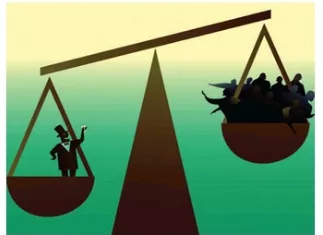The Matthew Effect And Nigeria’s Economic Struggles: A Tale Of Inequality And Strif
In the midst of Nigeria’s economic challenges, the Matthew Effect has emerged as a poignant framework to understand the exacerbation of poverty, inequality, and squalor. Coined by sociologist Robert K. Merton in the mid-20th century, the Matthew Effect draws its inspiration from the biblical verse in the Gospel of Matthew: “For to everyone who has, more will be given, and he will have abundance; but from him who does not have, even what he has will be taken away.” This concept encapsulates the cumulative advantage or disadvantage that individuals experience, creating a snowball effect in their economic trajectory. As we examine the economic landscape of Nigeria, the Matthew Effect becomes a lens through which we can comprehend the deepening divide and its far-reaching consequences.At the heart of Nigeria’s economic woes lies the rampant inflation and the skyrocketing cost of living. These adversities have not only heightened poverty levels but have also fueled a vicious cycle of inequality, perpetuating a system where the rich get richer while the poor face ever-mounting challenges.In Nigeria, the inflation rate has surged to unprecedented levels, eroding the purchasing power of the common citizen. This surge in prices for basic goods and services has a disproportionate impact on the poor, who find themselves struggling to make ends meet. A case in point is the cost of food, a significant component of the average Nigerian’s budget. Basic food items, such as rice and beans, have experienced alarming price hikes, forcing families to cut down on essential nutritional intake. The Matthew Effect is vividly evident here, as those already living in poverty face an increased burden, making it harder for them to break free from the cycle of deprivation.Furthermore, the rising cost of living in Nigeria has implications beyond just immediate economic challenges. It has a cascading effect on education, healthcare, and overall quality of life. Families experiencing financial strain are often forced to prioritize necessities over education, perpetuating a cycle of limited opportunities for the next generation. As access to quality education dwindles, the Matthew Effect ensures that the disadvantages incurred by one generation are passed on to the next.The Matthew Effect’s influence on inequality is further exemplified by the existing disparities in wealth distribution. The rich, equipped with financial resources, can leverage investment opportunities and diversify their portfolios to protect against the eroding effects of inflation. Meanwhile, the poor, grappling with daily survival, find it challenging to break into investment avenues, widening the wealth gap. Economic theories, such as Thomas Piketty’s r > g (where r is the rate of return on capital and g is the economic growth rate), elucidate how existing wealth tends to grow faster than the overall economy, exacerbating inequality. In Nigeria, this economic reality reinforces the Matthew Effect, deepening the chasm between the affluent and the impoverished.Real-life examples abound, showcasing the Matthew Effect in action. Consider the scenario of small-scale farmers in rural Nigeria. Inflation leads to increased costs of inputs such as seeds and fertilizers. Larger, wealthier farmers can absorb these rising costs, maintaining their productivity and profitability. However, smaller farmers, lacking the financial cushion, find their profit margins squeezed, pushing them further into poverty. This creates a dual effect: the wealthy farmers accumulate more resources, while the struggling ones face increased vulnerability.Addressing the Matthew Effect in Nigeria necessitates comprehensive and targeted policies that break the cycle of cumulative disadvantage. Policymakers must focus on implementing measures that alleviate the immediate burdens of inflation on the poor, such as targeted subsidies for essential goods and services. Additionally, efforts to enhance financial inclusion and literacy can empower marginalized communities to navigate economic challenges effectively.Furthermore, there is a need for structural reforms that address the root causes of inequality. Implementing progressive taxation policies, investing in education and healthcare, and fostering an environment conducive to entrepreneurship are vital steps in mitigating the Matthew Effect. Economic theories, such as Amartya Sen’s capability approach, underscore the importance of providing individuals with the necessary resources and opportunities to lead a life they value. In the context of Nigeria, this means creating an inclusive economic environment where all citizens have the chance to thrive, irrespective of their socio-economic background.Conclusively, the Matthew Effect serves as a poignant lens through which we can understand the economic challenges facing Nigeria today. Inflation, rising costs of living, and increasing inequality have created a self-perpetuating cycle of advantage for the affluent and disadvantage for the impoverished. Real-life examples, grounded in economic theories, illustrate the far-reaching consequences of this phenomenon. To break free from the grips of the Matthew Effect, Nigeria must embark on a path of targeted policy interventions and structural reforms that foster inclusivity and provide equal opportunities for all. Only then can the nation hope to build a more equitable and prosperous future for its citizens.





